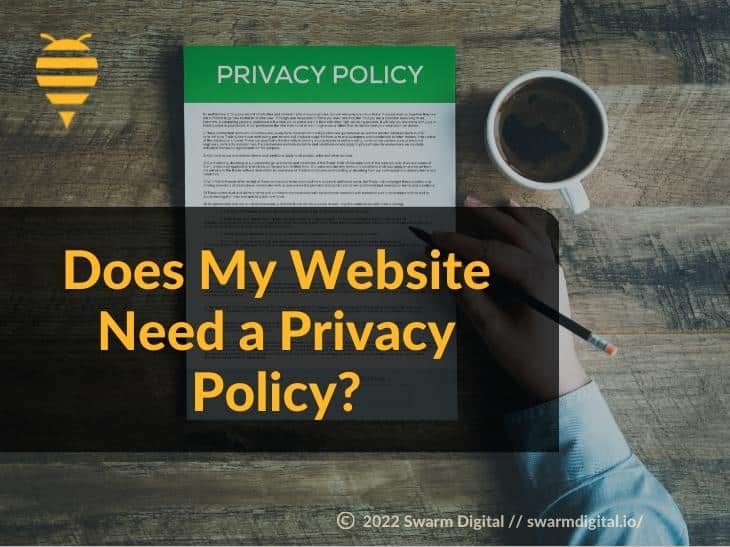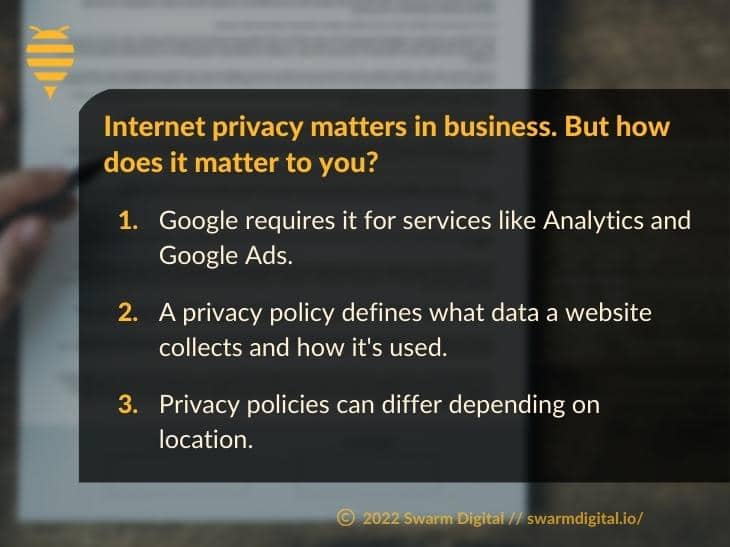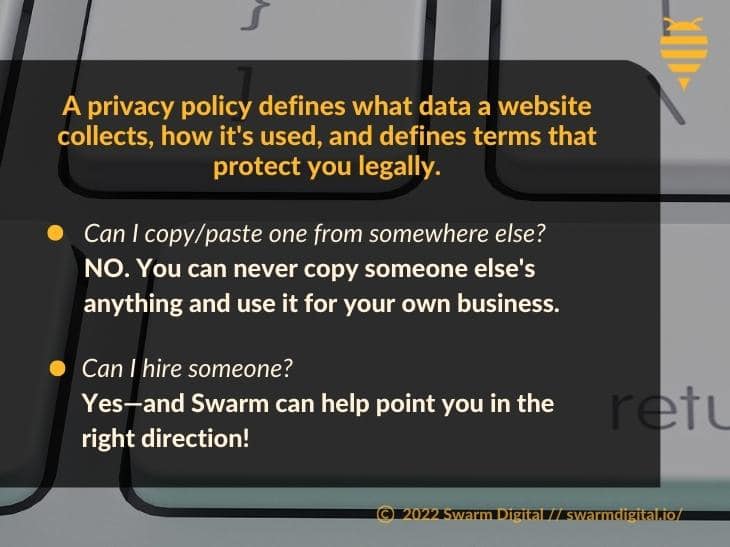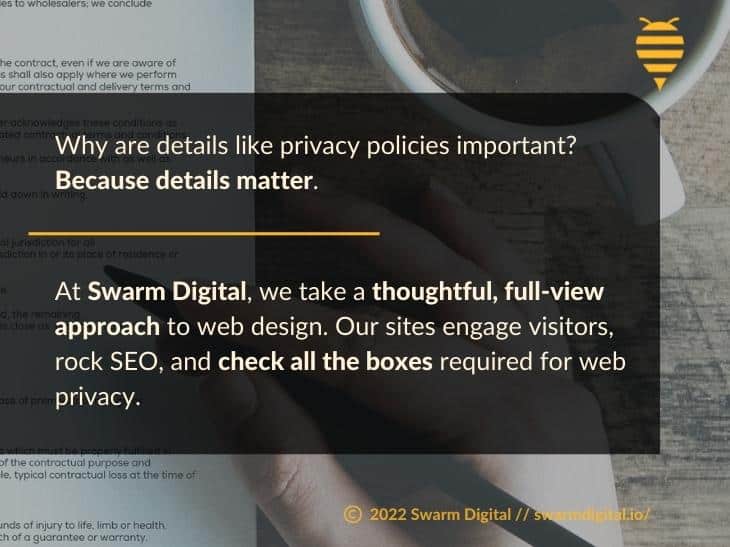Does My Website Need a Privacy Policy?
- June 7th, 2022
-
Branding
Community Spotlight
Web
- Swarm Digital

Let’s start with the bad news. Internet privacy is a battleground, and the fight is coming to your door. The web has turned challenging in terms of privacy. Politicians, billionaires, tech giants, and advertisers are the combatants; they constantly accuse their enemies of disinformation or other nastiness. The battle puts pressure on ordinary people like you who simply want to run a business on the Internet. So how does this conflict apply to you, and how do you protect yourself?
You can shield your business with a carefully designed website privacy policy. At Swarm, we require all websites we build or maintain to have a privacy policy; Google requires it for important services like Analytics and Google Ads. In this article, you’ll learn their value, and thoughts on crafting one that’ll protect your business from legal frustration.
Before We Start
Real quick—we at Swarm don’t write privacy policies. The gist of this article is that you should hire a legal professional or service to craft one. We’re not lawyers and don’t provide legal advice. Read on to learn why they’re vital to your site. If you’re worried that you won’t be able to generate a privacy policy, don’t worry about it. Every one of our sites has launched with one and that’s because we provide you with the guidance necessary to make sure it happens in a way that makes sense for you.

Internet Privacy and “The Big Fish”
Let’s begin with how web privacy issues affect the globe’s most prominent technology corporations.
-
- Apple – Earth’s shiniest, most corner-less tech titan made some big enemies when they changed privacy policies to protect users. Facebook will lose over $12 billion as a result.
- Twitter – Pinch your nose and hold this one at arm’s length: you can’t even talk about Twitter right now without raising somebody’s blood pressure. When it comes to privacy, one negative example of Twitter use is doxxing, where individuals have posted others’ private information, resulting in harassment or worse. Yes, there are others. We don’t want to get too Debbie Downer here, so we won’t list them.
- Facebook – Big Blue didn’t see far enough ahead with their privacy issues. Now, they’re paying out billions of dollars and losing even more in ad revenue.
- Amazon – You’ve heard similar anecdotes from friends: you’re sitting in your living room talking about how you’d like an oversized comforter. That night, an Amazon ad for comforters pops into your feed. Creepy? Perhaps real.
- Youtube – Youtube rabbit holes: we look up bad 90s shows, discover weird music. Some have accused these rabbit holes of going too far, automatically pointing users to videos that destroy minds, create political extremists, and worse. Does “the algorithm” create zombies? Science is asking.
- Google – The ones who hold all your private information have recently decided that you can optionally hide your private information.
So, what do we take away from this summary of corporate war and mayhem? One: blech. Two: internet privacy matters in business. But how does it matter to you?
Internet Privacy and Your Business
Across the globe, there’re a ton of laws regarding web privacy. Ironically they’re intended to regulate a world wide web. The result is often confusion, obscurity, and legal ambiguity. As Chesterton said, “Evil always takes advantage of ambiguity.”
The two biggest-deal examples of privacy regs today came out of California and Europe.

California
Take a moment to browse this treatise on California’s web privacy laws—or read this copy/pasted summary of what California expects from oag.ca.gov:
- The right to know about the personal information a business collects about them and how it is used and shared;
- The right to delete personal information collected from them (with some exceptions);
- The right to opt-out of the sale of their personal information; and
- The right to non-discrimination for exercising their CCPA rights.
Failure to meet California’s privacy requirements can result in hefty, hefty fines.
Europe
In Europe, here’s what you need (this is from the European Union website):
A specific privacy policy statement will contain the following information about the use of your data:
- What information is collected
- For what purpose it is collected
- The technical means by which it is collected
- Who sees your information
- How you can access, verify its accuracy and correct your information
- How long your data is kept
- What security measures are taken to safeguard your information
- Who to contact if you have questions or complaints
The Rest of the World
Two conclusions based on these examples: first, privacy policies can differ depending on location. Second, while your local business area might not require such policies yet, it’s likely to at some point. Here’s the thing: websites collect data, often even when you don’t think they are, and your business website probably does, too. As the web evolves from frontier to settlement, expect more regulation.

What Is a Privacy Policy, and How Do I Write One?
A privacy policy defines what data a website collects and how it’ll be used. It then defines terms that can protect you legally. It is a legal statement that can have legal repercussions. Crafting one should be a thoughtful process. For an example, check out our own.
Can I Copy/Paste One from Somewhere Else?
No. Google considers articles with a legal slant differently than others. You can never copy someone else’s anything and use it for your own business. That’s bad. Don’t close your eyes, swing, and hope for the best.
Can I Hire Someone?
At Swarm, we require every website we launch to include a privacy policy—and we have systems and policies in place to make sure our clients get them, ensuring they’re done properly. These policies are critical components you need to think through when preparing your site.
To create an effective privacy policy for your website, you might consider hiring an expert who knows what your site does, what data it collects and how, and the best method of defining that for website users. We can help point you in the right direction.

A 360-degree Approach to Your Website
Why are details like privacy policies important? Why is it vital to hire a web company that thinks through these things? Because details matter. At Swarm Digital, we take a thoughtful, full-view approach to web design. Our sites engage visitors, rock SEO, and check all the boxes required for web privacy. We don’t write privacy policies—you should have a legal professional do that. However, we do partner with you, leveraging our decades-plus experience to grow your customer base and improve searchability.
Because we care about the little things like coding websites well, our client Swagmatic saw a 180% increase in speed on their site. Synergy Orthopedics‘ organic web traffic leaped by 52%. Success like that is what happens when you hire a company with a 360-degree view of your site.
Need a web presence that will grow your business from a company that cares? Call Swarm Digital to learn how we can help improve your work on the web. Reach us at +1 (855) 244-4407 or click here to schedule a consult.
